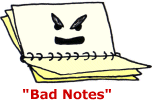

|
Note taking can:
- help you concentrate on what you are reading
- allow you to extract the main points from the lecture or the text
- help you understand a topic when you think about it later
- give you ideas when you are writing assignments or for exam revision

- are illegible
- are incomplete
- don't say what book or lecture they are based on
- are in no sequence
- can't be found when you need them
- are inaccurate
- never get looked at again
- Good notes, on the other hand, are indispensable.
HANDOUTS
Make notes on handouts. You will write down less and be able to make notes of your thoughts and
reactions alongside quotations
BE THOROUGH
Good housekeeping. Write down the DATE
and TITLE and NUMBER every sheet
EMPHASISE Underline key words or put them in CAPITAL LETTERS. Draw boxes around them or lines between words that show connections. Try using a different coloured pen to make it striking. Highlighter pens are great to pick out the most important words. Mark key words, main points, good examples, quotations, book references and ideas
PAPER TYPE Experiment with what works best for you: bound notebook, A4 loose sheets, spiral bound notebooks, plain paper, different line widths, coloured paper, recycled paper - whatever turns you on.
KEEP IT BRIEF
Don't write sentences - it takes too long and is unnecessary. Write down keywords - by listening for the most important words people actually remember more of a subject afterwards
ABBREVIATE
Think of useful abbreviations, using symbols or shorter forms of words you use regularly... for example:
| + | and | < | less than | + ve | positive |
| / | or | > | greater than | - ive | negative |
| = | equals | @ | at | ||
| therefore | % | percentage |
| LC | : literary criticism | F | : Freud |
| FR | : French Revolution | P | : Patriarchy |
Be simple, not creative.If you are too abstract you won't remember what your abbreviations stood for.

